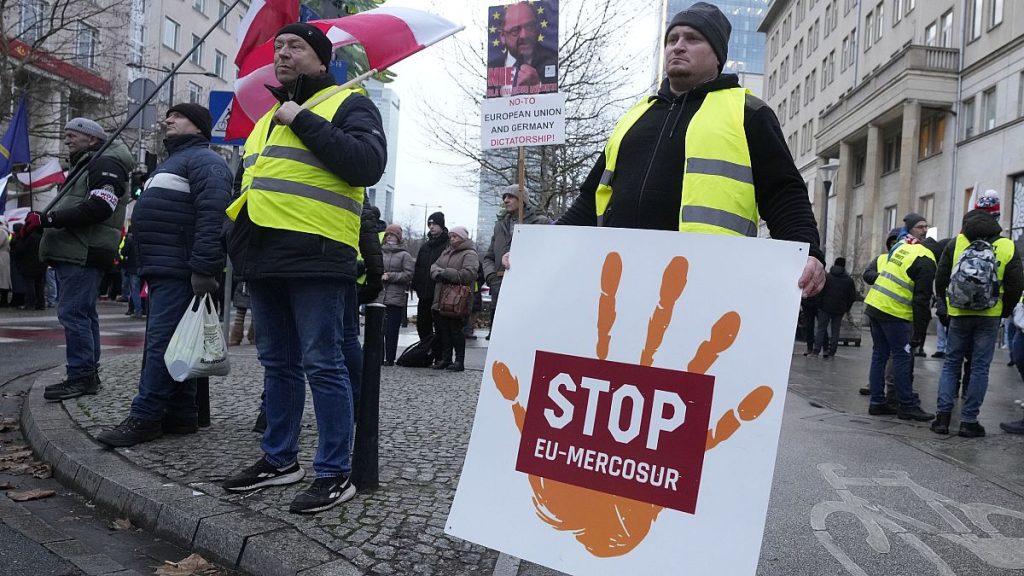The European Commission’s proposed financial support for farmers potentially affected by the EU-Mercosur trade deal has generated considerable debate and confusion. This support, intended to act as a safety net, is designed to address concerns that the agreement, once ratified, could negatively impact European agricultural markets, particularly sensitive sectors like beef and poultry. The Commission’s communication regarding this financial instrument has, however, been ambiguous, leading to uncertainty within the agricultural community. While touted as a protective measure to appease countries like France and Poland with significant agricultural sectors, the mechanism’s actual nature and implementation remain unclear.
The core of the ambiguity lies in the terminology used to describe the financial instrument. Initially presented by Trade Commissioner Maroš Šefčovič as a “fund” of at least €1 billion, it was later referred to as a “reserve” by a Commission representative during a meeting with EU ambassadors. This shift in terminology has significant implications, as a “fund” implies proactively allocated financial support for the agricultural sector, while a “reserve” suggests reactive funding disbursed only in the event of a crisis. This discrepancy has understandably raised concerns among farmers, who seek clarity on the nature and availability of this promised support.
The Commission has attempted to clarify the situation, describing the financial instrument as an “insurance policy” for farmers and rural areas, regardless of whether it’s termed a “fund” or “reserve.” This insurance policy will be allocated within the framework of the EU’s long-term budget, suggesting its integration into the Common Agricultural Policy (CAP), the EU’s agricultural subsidies program. Within the CAP, the distinction between a fund and a reserve is crucial. Funds, like the European Agricultural Guarantee Fund (EAGF) and the Rural Development Fund, provide proactive support for income and rural development. Reserves, like the existing annual agricultural reserve of €450 million, are reactive, activated only in exceptional circumstances. The proposed Mercosur support appears to align with the latter model, potentially even supplementing the existing agricultural reserve.
Despite the terminological confusion, the Commission insists that this reserve is purely precautionary. They emphasize that the safeguards integrated into the Mercosur agreement, such as market monitoring and import limits, are expected to adequately protect the EU agricultural sector, rendering the reserve unnecessary. The Commission expresses confidence that the agreement will function smoothly and prevent market disruptions. However, the reserve is intended to provide reassurance to farmers and rural areas, ensuring support availability should unforeseen negative consequences arise. This approach mirrors previous measures like the Brexit Adjustment Reserve (BAR), established to mitigate the economic impact of the UK’s withdrawal from the EU.
The experience with the BAR, however, highlights the potential challenges in implementing such reserves. Delays and unclear access criteria have frustrated some farmers, such as sugar beet producers, who claim they haven’t received promised support despite experiencing export losses. The Commission aims to avoid similar issues with the Mercosur reserve, ensuring timely and efficient support delivery should it be required. The goal is to provide a reliable safety net for European farmers, mitigating potential negative impacts of the trade deal and ensuring the agricultural sector’s stability.
The Commission’s intention is to provide a safeguard for farmers in the “worst-case scenario,” acknowledging the potential for unforeseen market disruptions despite the safeguards incorporated within the Mercosur agreement. The financial instrument, whether termed a “fund” or “reserve,” is meant to provide reassurance and act as an insurance policy for the agricultural sector. The Commission emphasizes its proactive measures to prevent any negative repercussions from the agreement, but the reserve stands as a contingency plan should the need arise. The ultimate goal is to protect European farmers and ensure the ongoing viability of the agricultural sector while pursuing the potential benefits of the EU-Mercosur trade deal. The Commission’s challenge lies in effectively communicating the nature and purpose of this financial instrument, addressing farmers’ concerns, and establishing a transparent and efficient mechanism for its implementation.














